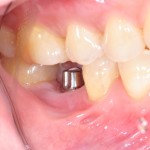
The placement of dental implants is a common surgical procedure and the prevention if infections at the surgical site and good wound healing is an important consideration for surgeons. Elective implant and bone graft procedures are regarded as Class II clean- contaminated surgery by the American College of Surgeon’s Committee on Control of Surgical Infection. The infection risk in considered to be in the order of 10-15% which can be reduced with good technique and prophylactic antibiotics. However, the use of antibiotics for dental implant remains controversial.
The aim of this review was to determine the efficacy of antibiotic prophylaxis and specific antibiotic regimens in dental implant placement for prevention of post-operative infection.
Methods
Searches were conducted in the PubMed, CINHAL, Embase and Dentistry & Oral Sciences Source (DOSS) and the databases US National Institutes of Health Clinical Trials (http://clinicaltrials.gov) Databases. Database searching was supplements by hand searches of relevant journal between January 200 and July 2017. International Journal of Oral and Maxillofacial Implants, European Journal of Oral Implantology, Clinical Oral Implants Research, International Journal of Oral and Maxillofacial Surgery, British Journal of Oral and Maxillofacial Surgery, Journal of Oral and Maxillofacial Surgery, Oral Surgery Oral Medicine Oral Pathology Oral Radiology and Endodontology, International Journal of Oral and Maxillofacial Surgery Clinical Implant Dentistry and Related Research, Dental Clinics of North America, Journal of Prosthetic Dentistry, Journal of Clinical Periodontology, Journal of Oral Implantology, Journal of Craniofacial Surgery, Journal of Periodontology, Journal of Cranio-Maxillofacial Surgery.
Randomised controlled trials (RCTs) comparing antibiotic with no antibiotics or placebo for dental implant placement were considered. Two reviewers independently selected studies with one review extracting data which was then reviewed by a 2nd reviewer. Risk of bias was assessed using the Cochrane tool. The primary outcome was post-operative infection (early, late, total) with wound dehiscence, pain, and adverse events of antibiotic treatment as secondary outcomes. Random-effects meta-analysis was conducted for risk ratios of dichotomous data.
Results
- 10 RCTs involving a total of 1934 patients were included.
- 2 studies were at low risk of bias, 2 at unclear risk and 6 at high risk.
- All 10 individual studies reported no statistically significant difference for post-operative infection.
- Meta-analysis found no statistically significant differences in early, late or total post-operative infection, wound dehiscence and adverse effects were seen between antibiotic and no-antibiotic groups.
| No. of studies | Risk Ratio (95%CI) | |
| All antibiotic regimens | 8 | 0.94 (0.54 – 1.62) |
| Pre-op antibiotics only | 6 | 1.05 (0.59 – 1.84) |
| 1-2 weeks post-op | 7 | 0.82 (0.41 –1.62) |
| 3-4 months post-op | 2 | 1.49 (0.24 –9.11) |
| Wound dehiscence | 2 | 0.69 (0.34 –1.42) |
Conclusions
The authors concluded: –
The results of the present systematic review and meta-analysis indicate that antibiotic prophylaxis may not be indicated for prevention of post-operative infections following dental implant placement in overall healthy patients. These findings, and in light of antibiotic-associated risks for individual and public health, demand revaluation of routine prescription of antibiotic prophylaxis in dental implant placement procedures.
Comments
Overall a very low level of post-operative infections was reported. The reviewers highlight that there is a lack of clarity regarding the definition of post-operative infection and wound dehiscence, so the review is based on the definitions used within the individual studies. Clearly as with other areas having recognised common outcomes sets would be valuable and improve the quality of systematic reviews. All the included studies employed pre- and post-operative chlorhexidine mouth rinsing regimens which very likely contributed to the low infection rates.
Overall this detailed review found no differences in infection rates between antibiotic and no antibiotic/placebo groups which suggests no benefit from their use in overall health patients.
Links
Primary Paper
Khouly I, Braun RS, Chambrone L. Antibiotic prophylaxis may not be indicated for prevention of dental implant infections in healthy patients. A systematic review and meta-analysis. Clin Oral Investig. 2019 Apr;23(4):1525-1553. doi:10.1007/s00784-018-2762-x. Epub 2019 Mar 1. Review. PubMed PMID: 30824982.
Other references
Dental Elf – 22nd Jun 2015
